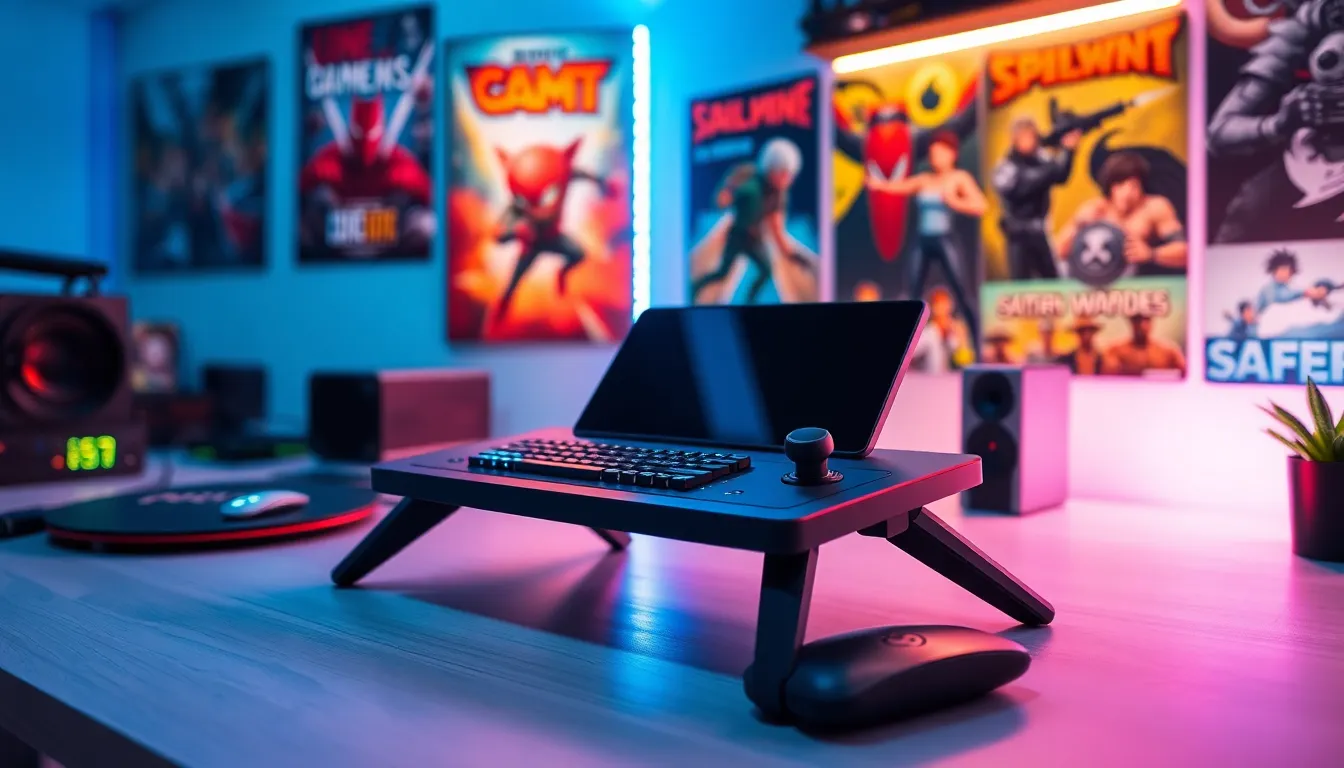The Steam Deck has revolutionized portable gaming, blending powerful hardware with a user-friendly interface. But what truly sets it apart is its foundation on Linux, giving gamers and developers a unique platform to explore. As more players dive into this handheld marvel, understanding its Linux underpinnings becomes essential.
With the Steam Deck running on a customized version of Arch Linux, it offers flexibility and customization that traditional consoles can’t match. Gamers can tweak settings, install software, and even run other operating systems, making it a playground for tech enthusiasts. This article delves into the benefits and features of Steam Deck Linux, showcasing why it’s not just a gaming device but a versatile tool for creativity and innovation.
Table of Contents
ToggleOverview Of Steam Deck Linux
Steam Deck Linux operates on a customized version of Arch Linux, designed specifically for the Steam Deck’s hardware. This OS provides a robust environment for gamers and developers alike.
Key Features
- Performance: Steam Deck Linux optimizes hardware performance, facilitating smooth gameplay for both AAA titles and indie games.
- Customization: Users can customize the system extensively, adjusting settings and installing software to create a personalized experience.
- Compatibility: Steam Deck Linux supports a wide range of games and applications available on the Steam platform, enhancing accessibility.
- Open Source: Being open source, Steam Deck Linux encourages community contributions, leading to continuous improvements and innovative features.
Multitasking Capabilities
Steam Deck Linux allows for multitasking, letting users run multiple applications simultaneously. This feature proves valuable for gamers who stream or record their gameplay while playing.
Gaming and Beyond
Beyond gaming, Steam Deck Linux serves as a versatile platform for various applications, including software development and creative tools. Its flexibility encourages users to explore different functionalities, increasing the device’s appeal.
Community Support
A vibrant community surrounds Steam Deck Linux, offering forums and resources for troubleshooting, tips, and modifications. Users can access a wealth of shared knowledge, enhancing their overall experience.
Steam Deck Linux redefines portable gaming by providing a powerful, customizable, and open-source platform that appeals to a broad audience.
Features Of Steam Deck Linux

Steam Deck Linux offers several features that enhance its functionality and user experience. Its flexible design allows users to tailor the system according to their needs, creating a unique gaming and computing environment.
Customization Options
- User Interface: Users can modify the interface easily, adjusting layouts and themes to match personal preferences.
- Software Installation: Users can install various Linux-compatible software, enabling a wide array of applications beyond games.
- Game Management: Users can organize their library and create custom launchers for streamlined access to games and applications.
- Controller Mapping: Users can customize controller inputs for individual games, optimizing controls for specific titles.
- Community Tools: Users benefit from community-created tools and mods, enhancing gameplay and expanding functionality.
Performance Metrics
- Graphics Capabilities: Steam Deck Linux supports up to 1200p resolution, providing high-quality visuals for a variety of games.
- Frame Rates: Users experience frame rates exceeding 60 FPS in many titles, ensuring smooth gameplay.
- Load Times: Users benefit from fast load times, thanks to the optimized system and SSD storage, enhancing overall performance.
- Battery Life: Users report optimized battery performance, allowing for up to 7 hours of gaming on a single charge, depending on usage.
- Multitasking Efficiency: Users can run multiple applications without noticeable lag, making it ideal for streaming and other tasks while gaming.
Gaming Experience On Steam Deck Linux
Steam Deck Linux provides an engaging gaming experience, leveraging its powerful hardware and customizable software environment. The flexibility of the platform enhances gameplay across various genres, making it a standout choice for gamers.
Compatibility With Games
Steam Deck Linux supports an extensive library of games, totaling thousands of titles. The vast majority of games available on the Steam platform run smoothly on this device, thanks to Proton, a compatibility layer that allows Windows games to operate on Linux. Users can expect seamless gameplay for popular titles across various genres, including action, RPG, and indie games. Regular updates to both the Steam platform and Proton continually improve compatibility, ensuring gamers receive the latest support for new releases.
User Interface and Usability
Steam Deck Linux features a user-friendly interface optimized for handheld gaming. The customized SteamOS allows for easy navigation between games, settings, and software applications. With integrated controller support, users enjoy a smooth experience, whether playing with the built-in controls or using external input devices. The interface also provides options for customization, allowing gamers to rearrange their library and prioritize favorite titles. Frequent community-generated modifications enhance usability by introducing personalized themes and tools, increasing overall satisfaction with the gaming experience.
Community Support And Resources
The Steam Deck Linux community plays a crucial role in enhancing the gaming experience. It offers a wealth of resources, enabling users to troubleshoot issues and expand their knowledge.
Forums and Online Communities
Forums and online communities serve as valuable platforms for Steam Deck Linux users. Popular forums include Reddit and Steam Community, where individuals share experiences, insights, and solutions. These platforms foster discussions about gameplay, customization, and troubleshooting. Users can seek advice on specific configuration issues, participate in polls about features, or showcase their custom setups. Engaging in these communities promotes a sense of belonging and provides immediate help from fellow users and enthusiasts.
Tutorials and Guides
Tutorials and guides are abundant and cater to users at various skill levels. Websites like GitHub and YouTube host detailed resources, covering everything from basic setup procedures to advanced modifications. Guides often include step-by-step instructions for installing software, optimizing performance, and tweaking settings for better gaming experiences. Additionally, community-generated content continuously emerges, ensuring that users access up-to-date information and solutions for the latest issues or updates.
Future Prospects For Steam Deck Linux
Steam Deck Linux stands at the forefront of portable gaming innovation, with significant growth opportunities ahead. As the platform matures, several factors contribute to its promising future.
- Enhanced Compatibility: Future software updates from Valve and community developers aim to improve the compatibility of more games, especially newer releases. The continued development of Proton aims to refine performance with Windows games, expanding playable titles.
- Increased Community Engagement: With a proactive community, contributions to Steam Deck Linux will likely amplify. Users will share more mods, optimizations, and tutorials, enhancing the collaborative environment. This engagement fosters a cycle of continuous improvement.
- Performance Upgrades: Steam Deck Linux might see hardware configurations offering better performance metrics. Potential upgrades may include improved battery life, enhanced graphics capabilities, or increased RAM, extending the device’s functionality for developers and gamers alike.
- Support for Emerging Technologies: As technologies like VR and AR evolve, Steam Deck Linux could integrate these features. This integration would appeal to a broader audience and introduce new gaming environments.
- Expansion of Creative Tools: Developers may prioritize creative software compatibility with Steam Deck Linux. Increased access to programming and design tools could attract users interested in software development, design projects, and content creation.
- Broader Software Ecosystem: The future might bring increased support for non-gaming applications, allowing users to leverage the device for productivity and educational tools. Expanding this ecosystem will attract a diverse user base.
- User Experience Innovations: Ongoing enhancements in user interface design and accessibility options are likely to make the device more user-friendly. Such innovations could cater to a wider audience, including those unfamiliar with Linux systems.
- Cloud Gaming Integration: Partnerships with cloud gaming services may lead to significant expansions. Users could access a broader array of games without needing extensive local storage or high-end hardware.
Investments in these areas position Steam Deck Linux as a versatile platform, balancing gaming with broader creative and productivity capabilities, ensuring it remains a vital player in the gaming landscape.
Steam Deck Linux stands out as a groundbreaking platform that transforms portable gaming. Its unique combination of powerful hardware and customizable software opens doors for gamers and creators alike. The thriving community surrounding Steam Deck Linux enhances the experience through shared knowledge and resources, fostering a collaborative environment.
As the platform evolves, users can expect ongoing improvements in game compatibility and performance. The potential for future innovations in VR and AR further solidifies its place in the gaming landscape. With its versatility and commitment to user-driven customization, Steam Deck Linux is poised to redefine what portable gaming can achieve.








